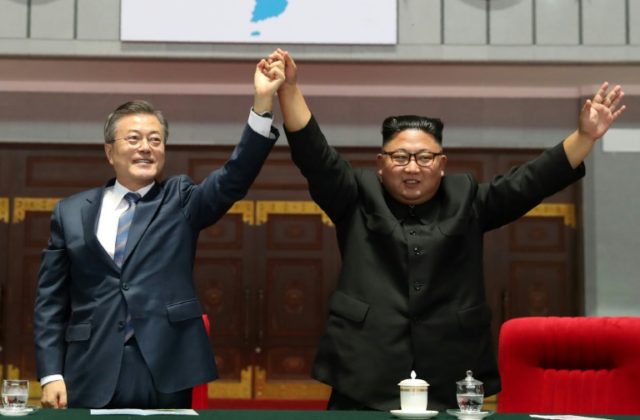South Korea’s leftist government under President Moon Jae-in abandoned the use of the word “enemy” to describe North Korea, despite the active status of the Korean War, in its most recent defense white paper published Wednesday.
The decision to identify South Korea’s enemies only as “forces which threaten and infringe on the sovereignty, territory, citizens and assets” of the country, without specifying a nation that South Korea is technically at war with, has the potential to once again outrage South Korean conservatives and North Korean defectors in the country who have condemned the Moon administration for attempting to bring Seoul too close to Pyongyang without demanding any changes from the rogue communist state.
Moon has held several in-person meetings with dictator Kim Jong-un, most recently visiting Pyongyang in September, and urged the world this month to reconsider crippling sanctions on the North Korean regime despite the lack of evidence that Kim’s regime has made any moves towards improving its treatment of human rights or ending its illegal nuclear weapons program.
Moon also approved a plan to cut as many as 100,000 troops from the South Korean military generally and limit the South Korean troop presence on the inter-Korean border, or Demilitarized Zone (DMZ), in mid-2018.
Chosun Ilbo reported on Wednesday that the white paper, which South Korea’s Defense Ministry releases every two years, appears to have removed a plan present in the previous edition called “Korea massive punishment and retaliation” and changed the language referring to Japan, no longer identifying it as a country that “shares the basic values of free democracy and market economy.”
“The description of North Korea as the enemy has been scrapped and readopted several times depending on governments’ ideological leanings,” Chosun reports. “But the nuclear and missile threat from the North remains real, and some critics believe the defense white paper should more clearly reflect that to maintain vigilance among the armed forces.”
The newspaper adds that the Defense Ministry explained the absence of North Korea, Seoul’s primary military threat, from the defense white paper was necessary because “invasions and threats by foreign forces are not restricted to North Korea.” The ministry did not name any other nations it considered a threat of invasion, however.
The Associated Press (AP) notes that the white paper has not failed to refer to North Korea as an enemy in this way since 2010. It does mention North Korea’s illegal nuclear weapons program as a “threat to peace and stability on the Korean Peninsula” and estimates that North Korea may have as many as nearly 700,000 more troops than the South.
The paper was released a week after Moon personally made the call for the international community to ease sanctions on North Korea. The United Nations approved an unprecedentedly strict list of sanctions on North Korea following its most recent nuclear bomb test in September 2017.
“We welcome North Korea’s intention to resume their operation without conditions or compensation,” Moon said at a press conference. “My administration will cooperate with the international community, including the United States, to resolve the remaining issues such as international sanctions as soon as possible.”
He went on to add that North Korea “needs to take practical denuclearization steps more boldly if it wishes to resolve the issue of international sanctions because the issue of international sanctions depends on the speed of North Korea’s denuclearization process.”
Critics of Moon’s administration have noted that Moon regularly failed to bring up the issue of human rights when discussing North Korea, and has not publicly done so in his meetings with Kim. North Korean defectors living in the South have further accused the Moon administration of silencing their harrowing stories of survival and attempting to keep them off of television by pressuring news outlets. Late last year, South Korea’s Unification Minister Cho Myoung-gyon banned a journalist from a press conference on inter-Korean relations because he was born in North Korea, prompting outrage among the Seoul press corps.
North Korea has arguably the world’s worst record on human rights abuses, known to routinely torture and publicly execute suspected dissidents. The state identifies non-atheists, individuals found possessing any entertainment not produced in North Korea, and insufficiently enthusiastic communists as national security threats. Those who are not immediately killed are typically sent to live in labor camps for multiple generations. The number of people tortured in labor camps is estimated to be in the hundreds of thousands.

COMMENTS
Please let us know if you're having issues with commenting.